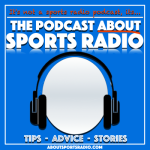The quest to introduce you to different members of the sports media continues. With thousands performing this line of work each day, there are a lot of great opinions, strategies, styles, and experiences to learn from.
As much as I enjoy sharing my own perspectives, I feel it’s equally important to provide a platform for others to share their views as well.
 Last month I partnered with Zach McCrite to offer his “Podcast About Sports Radio” here on the website. Hopefully you’ve enjoyed listening to some of the great conversations that he’s conducted with various members of the sports media.
Last month I partnered with Zach McCrite to offer his “Podcast About Sports Radio” here on the website. Hopefully you’ve enjoyed listening to some of the great conversations that he’s conducted with various members of the sports media.
Now though, it’s time to add another wrinkle to the website.
Starting today, and going forward, I will feature some exclusive written pieces from different members of the sports media on SportsRadioPD.com. Program Directors, Talk Show Hosts, Play by Play Announcers, Producers, Update Anchors, Reporters, Imaging Director’s, Voice Talent, and Sellers, will offer their own personal thoughts on subjects that resonate with them and apply to the industry we make our living in.
The goal of this website is to be a resource of information to those who work in the industry, and to educate and entertain those who listen or watch our work, and/or wish to learn more about it. If you work in sports media, and have an interest in contributing a future column, email me at JBarrett@hvy.tcp.mybluehost.me.
 To kick things off, I am thrilled to present this exclusive piece by Matt Fishman. During Matt’s career, he has served as a Program Director, Sports Director, and Executive Producer for great sports radio brands such as The Score in Chicago, SiriusXM, and 610 Sports in Kansas City.
To kick things off, I am thrilled to present this exclusive piece by Matt Fishman. During Matt’s career, he has served as a Program Director, Sports Director, and Executive Producer for great sports radio brands such as The Score in Chicago, SiriusXM, and 610 Sports in Kansas City.
The subject he wrote about was the 2015 MLB Playoffs, and the importance of welcoming casual fans into a broadcast and avoiding mistakes that cause them to tune out. I think you’ll enjoy his insight and I encourage you to connect with him on Facebook or Twitter. His information is listed below.
Jason Barrett
Why The MLB Playoff Broadcasts Matter!
In watching and listening to the 2015 Baseball Playoffs I have noticed that both radio and TV broadcasts have not welcomed “casual fans” to their broadcasts. Here are a few examples:
Early in the playoffs I heard Aaron Boone talk about a player’s OPS. If you’re a die-hard baseball fan, you’ll know that OPS is a baseball statistic stands for On Base + Slugging percentage.
The problem with Aaron Boone’s analysis during the playoffs—a lot of people listening don’t know what OPS is. In the playoffs, both TV and Radio audiences grow as more casual fans tune in. They have to feel welcomed to the broadcast.
Aaron Boone or the Play by Play announcer should have interjected a description of what OPS is and why it is important. Here’s an example.
OPS measures a player’s ability to get on base and his power. A player with a high OPS is typically able to both get on base and hit for power. Players with an OPS of .900 or higher are generally considered to be the best hitters. The all-time leader in OPS is Babe Ruth at 1.1638.
 Sam Ryan (TBS and MLB Network)
Sam Ryan (TBS and MLB Network)
During a Cubs/Mets NLCS game, TBS reporter Sam Ryan interviewed Mets Manager Terry Collins. Where Ryan missed the mark—she asked the manager about a number of players only mentioning them by their first names.
If you’re a die-hard Mets fan, you knew who they were talking about. For a more casual fan, hearing questions about “David, Noah, Daniel, and Curtis” is utterly confusing and a complete waste of the manager interview.
Why does this matter to you and your station? Because in the battle for ratings you would do anything to get some additional ears on your brand. So don’t blow the opportunity when your town has a hot team. Take these extra steps to make these new listeners feel welcome:
- Roll out the Red Carpet: Welcome in new listeners by sticking to the big story or big team (“Play the hits”), avoid inside jokes, explain any regular segments, contributors and benchmarks. Avoid anything that may turn off new listeners to your station.
- Reset: Likely more than your hosts are comfortable with. WHO is on the air and WHAT are we covering, HOW we are covering it, and WHEN you can hear the next live report, live guest, etc.
- Imaging: You need to have team specific imaging to re-inforce your coverage.
- Phone Calls: Encourage new listeners to call in. Have a “First time caller” segment to welcome or reward new listeners. Avoid long calls with station regulars.
If you make the casual fans feel welcome when they check out your station, not only will you enjoy the ratings blip of a playoff team, but you can create more P1’s (hardcore listeners) that will tune in year round!
Matt Fishman has spent over 20 years in Sports radio programming. He has been Sports Director of The Score-WSCR/Chicago, Program Director at 610 Sports KCSP/Kansas City, Executive Producer MLB Home Plate at XM Satellite Radio, and Program Director of SiriusXM College Sports Nation. You can connect with him on Twitter by clicking here or on Facebook by clicking here.

Jason Barrett is the President and Founder of Barrett Media since the company was created in September 2015. Prior to its arrival, JB served as a sports radio programmer, launching brands such as 95.7 The Game in San Francisco, and 101 ESPN in St. Louis. He also spent time programming SportsTalk 950 in Philadelphia, 590 The Fan KFNS in St. Louis, and ESPN 1340/1390 in Poughkeepsie, NY. Jason also worked on-air and behind the scenes in local radio at 101.5 WPDH, WTBQ 1110AM, and WPYX 106.5. He also spent two years on the national stage, producing radio shows for ESPN Radio in Bristol, CT. Among them included the Dan Patrick Show, and GameNight.
You can find JB on Twitter @SportsRadioPD. He’s also reachable by email at Jason@BarrettMedia.com.






